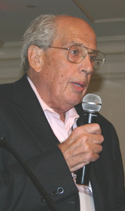The 2007 Progeria Research Foundation
Workshop on Progeria
|
|
Meeting Dates and Times:
|
|
Monday evening, November 12 through Wednesday afternoon, November 14, 2007.
Location: Colonnade Hotel, Boston, MA
With nearly 100 participants and 30 posters, the workshop was another successful meeting of scientists and clinicians whose work continues to substantially influence this fast-growing field of study, setting the stage for the next round of progress towards treatments and a cure for Progeria.
Speakers included leading scientists in the fields of heart disease, aging, genetics, and laminopathies.
Each of the four previous Progeria workshops has had a profound impact on the course of Progeria research, helping to elevate Progeria research from a position of minimal scientific recognition to a vibrant field of research which includes new avenues for studying the mechanisms of both aging and cardiovascular disease. Prior workshops have provided a collegial environment and have stimulated an exchange of ideas during the open discussion periods, leading to a number of collaborations. This atmosphere continued to be fostered in the 2007 Workshop. There was also an opportunity to hear from and meet with families living with Progeria.

“The depth and breadth of the data being generated and talked about today is truly breathtaking.” Francis Collins, MD, PhD, Director of the National Human Genome Research Institute that mapped the human genome, workshop speaker and co-discoverer of the Progeria gene.

Nearly all past and present PRF research grantees attended this year’s meeting.
- Cardiovascular Disease: Talks by Drs. Marie Gerhard-Herman (Harvard, Boston), Elizabeth Nabel and Francis Collins (NIH, Bethesda) centered on characterizing heart disease in children with Progeria and in mouse models of Progeria. Presentations compared Progeria with cardiovascular disease in the general aging population. Dr. Nabel’s presented data from ongoing analysis of the NIH natural history study,, Dr. Collins showed exciting new data on the effects of FTI drug treatment in Progeria mice
-
Aging: Dr. Karima Djabali (Columbia U., New York) explored evidence that the Progeria protein called “progerin” is present not only in children with Progeria, but also in human cells and tissue of non-Progeria, aging population. Dr. Yue Zou, E. Tennessee State U. focused on how cell signaling and cell cycling in aging and Progeria cells compare, Both presentations highlight that we can understand cellular aging better by studying Progeria.
-
Laminopathies: The gene responsible for Progeria is called “lamin”, and diseases found on the gene are called laminopathies. Dr. Joanna Bridger, (Brunel U., England) and Dr. Jan Lammerding (Harvard, Boston) demonstrated how studying each laminopathy yields valuable information on all of these diseases by comparing studies of Progeria and laminopathy cell abnormalites with normal cell properties.
-
Lamin Biology and Nuclear Membrane Proteins: Presentations by Dr. Robert Goldman (Northwestern U.,Chicago), Dr. Lucio Comai (U. Southern Cal., LA), Dr. Michael Sinensky (East Tennessee State U.) and Dr. Bryce Paschal (U. Virginia Med. School) focused on various aspects of the biochemistry of normal and abnormal protein processing in nondiseased states and in Progeria. Studies reveal that there are several points along the processing pathways that may lead us to treatments or a cure for progeria. Studying both normal and abnormal pathways are essential to these goals.
-
Bone, endocrine, extracellular matrix and dermatological studies of Progeria: Dr. Catherine Gordon (Children’s, Boston) The natural history of Progeria was compared with diseases such as osteoporosis, insulin resistance, and scleroderma. Data was derived from baseline findings from studies conducted at Boston Children’s Hospital, and clinical chart analysis from PRF’s Medical & Research Database. and Dr. Stephen Young, (UCLA, Los Angeles) presented studies of fat loss in Progeria.
-
Treatment Strategies:
a) A presentation of the design and rationale of the ongoing clinical trial using a farnesyltransferase inhibitor by its P.I., Dr. Mark Kieran, and results of treatment with FTI on other disease processes was discussed. Follow-up studies on improvement of disease after FTI treatment of Progeria mouse models was also presented by Dr. Francis Collins.b) Effects of stem cell replacement: Several recent reviews have proposed that failure to maintain tissue homeostasis in the wake of increased rates of cell death in Progeria may be a major factor in progression of the disease, and that replenishment of mesenchymal stem cells may overcome these defects. Dr. Irina Conboy (U. California, Berkeley) presented results from Progeria-specific studies and the effects of stem cell replacement
c) Other potential strategies for future treatment of Progeria were presented by Dr. Carlos Lopez Otin (U. Oviedo, Spain) who has conducted new drug treatments in a mouse model of Progeria, and by Dr. Tom Misteli (NIH) who is searching for novel drug treatments in Progeria using a newly developed small molecule drug screen.
 Click here for a PDF of the Agenda
Click here for a PDF of the Agenda


